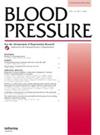获得可靠的家庭血压和高血压状态估计所需的测量天数
IF 2.3
4区 医学
Q2 PERIPHERAL VASCULAR DISEASE
引用次数: 5
摘要
【摘要】目的门诊外血压(BP)测量对高血压的诊断和监测至关重要。目前的指南对家庭血压监测(HBPM)方案的建议各不相同。我们的目的是评估可靠估计真实家庭血压(随时间推移的预期血压水平)和高血压状态所需的血压(BP)测量天数,使用基于欧洲指南的7天HBPM方案作为参考。材料和方法对567例进行7天HBPM的成人数据进行分析。使用微生命平均模式(MAM)每天测量两次血压(早晨和晚上的读数),该模式取连续3次血压读数的加权平均值。使用线性混合模型(包括每个个体的随机截距和相关残差)评估越来越多测量的平均BP的可变性。采用κ统计量评估家庭高血压状况的可靠性。结果人群的平均血压为143±16/84±10 mm Hg,平均首次血压测量值最高,随后随时间下降。早晨收缩压明显低于晚上收缩压(142±17mm Hg vs 144±17mm Hg, p <0.05)。每日7次MAM血压测量的平均值最多比真实家庭血压高5.2/3.3 mm Hg,比真实家庭血压低9.5/4.8 mm Hg,占95%。将试验时间缩短至3天,这一变异性分别增加1.5/1.0 mm Hg和4.8/2.3 mm Hg。对于家庭高血压的诊断,至少4.5天的HBPM (ĸ-statistic 0.88;95%置信区间:0.82-0.94)。结论每日两次连续3天的MAM血压测量可提供可靠的家庭血压估计。至少连续4.5天的HBPM需要可靠的家庭高血压诊断。本文章由计算机程序翻译,如有差异,请以英文原文为准。
Number of measurement days needed for obtaining a reliable estimate of home blood pressure and hypertension status
Abstract Purpose Out-of-office blood pressure (BP) measurements are essential for the diagnosis and monitoring of hypertension. Current guidelines vary in their recommendations on the protocol for home blood pressure monitoring (HBPM). We aimed to assess the number of blood pressure (BP) measurement days needed for a reliable estimation of true home BP (the expected BP level over time) and hypertension status, using the European guideline-based 7-day HBPM protocol as a reference. Materials and Methods Data from 567 adults who performed a 7-day HBPM were analysed. Blood pressure was measured twice daily (morning and evening readings) using the Microlife Average Mode (MAM), which takes a weighted average of 3 consecutive BP readings. The variability of average BP for an increasing number of measurements was assessed using a linear mixed model including a random intercept per individual and correlated residuals. The reliability of home hypertension status was assessed by the κ statistic. Results Mean home BP of the population was 143 ± 16/84 ± 10 mm Hg. On average, the first BP measurements gave the highest values which then decreased over time. Systolic BP in the morning was systematically lower than systolic BP in the evening (142 ± 17mm Hg versus 144 ± 17 mm Hg, p <0.05). The average of 7 twice-daily MAM BP measurements was at most 5.2/3.3 mm Hg higher and 9.5/4.8 mm Hg lower than the true home BP for 95% of the individuals. Reducing this protocol to 3 days increased this variability by 1.5/1.0 mm Hg and 4.8/2.3 mm Hg, respectively. For diagnosing home hypertension, there was good agreement with a minimum of 4.5 days of HBPM (ĸ-statistic 0.88; 95% Confidence Interval: 0.82–0.94). Conclusion Twice-daily MAM BP measurements for 3 consecutive days provide a reliable estimate of home BP. At least 4.5 consecutive days of HBPM are required for a reliable diagnosis of home hypertension.
求助全文
通过发布文献求助,成功后即可免费获取论文全文。
去求助
来源期刊

Blood Pressure
医学-外周血管病
CiteScore
3.00
自引率
5.60%
发文量
41
审稿时长
6-12 weeks
期刊介绍:
For outstanding coverage of the latest advances in hypertension research, turn to Blood Pressure, a primary source for authoritative and timely information on all aspects of hypertension research and management.
Features include:
• Physiology and pathophysiology of blood pressure regulation
• Primary and secondary hypertension
• Cerebrovascular and cardiovascular complications of hypertension
• Detection, treatment and follow-up of hypertension
• Non pharmacological and pharmacological management
• Large outcome trials in hypertension.
 求助内容:
求助内容: 应助结果提醒方式:
应助结果提醒方式:


